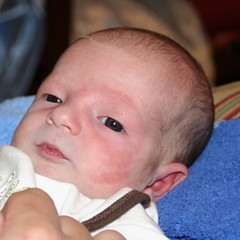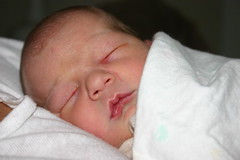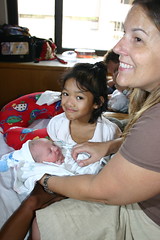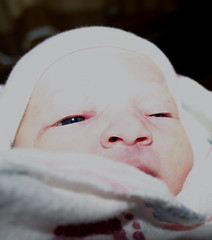THE OMNIVORE'S DILEMMA
Michael Pollan, Berkeley journalism prof and NYT Magazine contributor and writer on the politics of food, has been the center of a lot of media attention recently for his book THE OMNIVORE'S DILEMMA. The book's heart is a neat little conceit: follow several meals from production to consumption. Divided into three main sections, Pollan's book looks at a fast-food meal, a meal prepared with ingredients produced on organic farms, and a meal that Pollan hunted and gathered himself.
For me, the most interesting part of the book by far was the initial section, which looked at industrial food production. Much of this field has been tilled before, notably by Eric Schlosser in FAST FOOD NATION, but where Schlosser was just a muckracker--a great one--Pollan looks at food production and consumption from a more philosophical standpoint. However, the section on industrial food production was quite similar to Schlosser's argument. Where Pollan differs is in his ultimate thesis for this part: that pretty much everything Americans eat, and how they eat it, is a result of the massive surpluses of corn produced by midwestern farmers, encouraged and subsidized by the Department of Agriculture. (Earl Butz comes in for predictable opprobrium.) Farmers are encouraged to produce as much corn as possible, not even stopping when prices drop dramatically because they are guaranteed subsidies. So what do we do with this corn? Pollan argues that processed food--much of which ends up being 80% corn and corn-derived chemicals--is the answer. Like Schlosser, he demonizes high-fructose corn syrup, but he also points out how corn is the origin for a vast amount of the things we eat.
The most disturbing part of this section is Pollan's description of the use of corn to feed ruminant livestock. Cattle are meant to eat grasses, but because there is so much corn and it's got to be used, livestock scientists have figured out how to feed it to them. They don't like it, and their systems rebel, leading to constant infections (and the need for massive infusions of antibiotics), but it's cheaper than feeding them grass. Pollan asks, as an adjunct question, why the French can eat so much fatty stuff, so much animal fat, and not have our health problems. Although he only finds one scientific article to back it up, he suggests that our meat and milk itself--and our chickens and hogs--are less healthy FOR US, not just less healthy themselves, because of what we insist on feeding them.
It's a very powerful argument about the relentlessness of capitalist logic--produce as cheaply as possible, use economies of scale--and about how that kind of logic artificially isolates costs so that our meat and grain SEEMS cheap but that doesn't take into consideration all of the other costs: armies in the Middle East ensuring that we get our oil, landscapes ruined by manure lagoons or agricultural monoculture on a massive scale, global warming, etc.
I was less interested in the rest of the book, and although Pollan seems to really have gotten a kick out of hunting his own boar and gathering his own morels in the Berkeley area I just don't see that as an option for a metro area of 10 million or so. (This isn't what he's proposing, though.) His ultimate prescription is, essentially, EAT LOCALLY. Eat from small farms in your area, avoid processed food so as not to encourage the massive industrialization of food production that stands behind it. "Organic" itself isn't crucial; organic farms can be just as industrial, and just as harmful and cruel, as conventional ones.
For me, the most interesting part of the book by far was the initial section, which looked at industrial food production. Much of this field has been tilled before, notably by Eric Schlosser in FAST FOOD NATION, but where Schlosser was just a muckracker--a great one--Pollan looks at food production and consumption from a more philosophical standpoint. However, the section on industrial food production was quite similar to Schlosser's argument. Where Pollan differs is in his ultimate thesis for this part: that pretty much everything Americans eat, and how they eat it, is a result of the massive surpluses of corn produced by midwestern farmers, encouraged and subsidized by the Department of Agriculture. (Earl Butz comes in for predictable opprobrium.) Farmers are encouraged to produce as much corn as possible, not even stopping when prices drop dramatically because they are guaranteed subsidies. So what do we do with this corn? Pollan argues that processed food--much of which ends up being 80% corn and corn-derived chemicals--is the answer. Like Schlosser, he demonizes high-fructose corn syrup, but he also points out how corn is the origin for a vast amount of the things we eat.
The most disturbing part of this section is Pollan's description of the use of corn to feed ruminant livestock. Cattle are meant to eat grasses, but because there is so much corn and it's got to be used, livestock scientists have figured out how to feed it to them. They don't like it, and their systems rebel, leading to constant infections (and the need for massive infusions of antibiotics), but it's cheaper than feeding them grass. Pollan asks, as an adjunct question, why the French can eat so much fatty stuff, so much animal fat, and not have our health problems. Although he only finds one scientific article to back it up, he suggests that our meat and milk itself--and our chickens and hogs--are less healthy FOR US, not just less healthy themselves, because of what we insist on feeding them.
It's a very powerful argument about the relentlessness of capitalist logic--produce as cheaply as possible, use economies of scale--and about how that kind of logic artificially isolates costs so that our meat and grain SEEMS cheap but that doesn't take into consideration all of the other costs: armies in the Middle East ensuring that we get our oil, landscapes ruined by manure lagoons or agricultural monoculture on a massive scale, global warming, etc.
I was less interested in the rest of the book, and although Pollan seems to really have gotten a kick out of hunting his own boar and gathering his own morels in the Berkeley area I just don't see that as an option for a metro area of 10 million or so. (This isn't what he's proposing, though.) His ultimate prescription is, essentially, EAT LOCALLY. Eat from small farms in your area, avoid processed food so as not to encourage the massive industrialization of food production that stands behind it. "Organic" itself isn't crucial; organic farms can be just as industrial, and just as harmful and cruel, as conventional ones.




